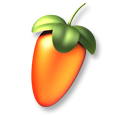
FL Studio
FL Studio (known as FruityLoops before 2003)[5] is a digital audio workstation (DAW) developed by the Belgian company Image-Line. It features a graphical user interface with a pattern-based[6] music sequencer. It is available in four different editions for Microsoft Windows and macOS.[7]
"FruityLoops" redirects here. Not to be confused with Froot Loops.Original author(s)
Didier Dambrin
April 26, 1998 (as FruityLoops)
English, German, Chinese
After their initial purchase, lifetime updates of the software are free to registered users.[8][9] Image-Line also develops FL Studio Mobile for Android, iOS, macOS, and Universal Windows Platform devices.[10]
FL Studio can be used as either a Virtual Studio Technology (VST) or Audio Unit (AU) instrument in other audio workstation programs, and as a ReWire client. Image-Line offers its own VST and AU instruments and audio applications. FL Studio has been used by many notable hip hop and EDM producers, including 9th Wonder, Cardo, Metro Boomin, Hit-Boy, Porter Robinson, Alan Walker, Madeon, Soulja Boy, Southside, Martin Garrix, Avicii, Imanbek, Lex Luger, and Deadmau5, Tuamie of Mutant Academy.[11][12]
History[edit]
The first version of FruityLoops (1.0.0) was developed by Didier Dambrin and was partially released on December 18, 1997.[13] Its official launch was in early 1998, when it was still a four-channel[14] MIDI drum machine.[15] Dambrin became Chief Software Architect for the program,[9] and it quickly underwent a series of large upgrades that made it into a popular and complex digital audio workstation.
Image-Line renamed FruityLoops to FL Studio in mid 2003, after the company's attempt to obtain a US trademark prompted concerns from Kellogg's.[16] and to improve the software's marketability.[5] Software piracy was a major issue in the company's early days, and it took nearly 5 years for the company to earn money from users purchasing legitimate licenses.[11]
A macOS-compatible version of FL Studio was released on May 22, 2018.[17]
Overview[edit]
Editions[edit]
FL Studio comes in several editions with different levels of functionality. The free trial version includes all of the program's features, all plugins, and allows users to render project audio to WAV, MIDI, MP3, FLAC and OGG.[7] Projects saved while in demo mode, however, can only be opened once FL Studio and its plugins have been registered. Also, instrument presets cannot be saved and the audio output of some instruments is cut out momentarily every few minutes until the program and its plugins have been registered.[18]
Dedicated hardware[edit]
As with other DAW developers, Image-Line has collaborated with hardware manufacturers on two occasions, resulting in the release of products branded and compatible with FL Studio.[33]
The first was the Akai FIRE, a MIDI controller with touch and pressure-sensitive buttons modelled after the software's channel rack pattern editor. Released in 2018, it can be used as a pattern editor, keyboard, drumpad, multi-colour peak visualizer and performance controller. A distinctive feature of the Akai FIRE is that up to 4 units can be connected to a single instance of FL Studio, chained together or with a different mode set for each. It is sold in two variants, one coming without extra software (aimed at existing FL Studio users), and one bundled with an exclusive version of the Fruity edition called the Fruity Fire Edition.
The latter of these involvements is currently the Novation FL Key line of controllers. It consists of two redesigned MIDI Keyboards – dubbed the FL Key Mini and the FL Key 37, the latter being larger in keybed and size – originally from Novation's own Launchkey line, modified to have a grey case and an FL Studio-themed RGB lighting palette.
Despite some initial traction regarding the Akai FIRE's unusual velocity implementation, both units have gone on to receive broadly positive reception from the professional press.[34][35]
Reception[edit]
FL Studio has been praised for its simplicity, power, and ease of use.[36][37] Jamie Lendino of PCMag wrote that "While [FL Studio is] still clearly geared for electronic music production 'in the box,' as opposed to recording live musicians playing acoustic instruments, you can record or create just about any kind of audio project with it."[38] Criticisms include a difficult audio recording system.[39][40]
Toby Fox used the program to make the soundtrack to Undertale and Deltarune.[41]